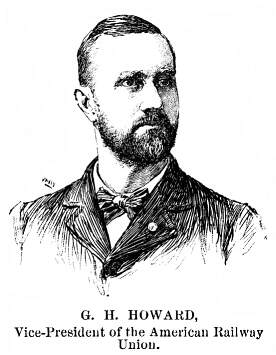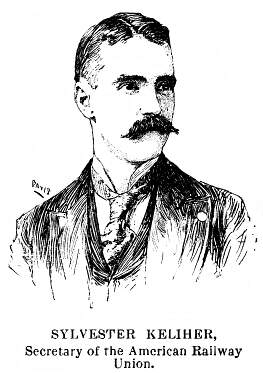THE SITUATION IN CHICAGO.
CHICAGO, Friday, July 6, 1894—John D. Sherman, City
Editor Tribune
THOUGH yesterday was marked by savage rioting in and around
the Union Stock-Yards, it is believed in Chicago that the end
of the strike is in sight. The beginning of the end was when the
United States troops from Fort Sheridan arrived in the City early
in the morning of the Fourth. If the end of the strike in Chicago
means the end of the strike all over the country, then the end
of the whole outbreak is in sight. If the situation does not improve,
the United States troops will be ordered to shoot. It is a marvel
that shooting was not done yesterday and to-day. In fact, it is
believed here that the minute the command to fire is given, that
minute the strike is over. The strikers are bold now because they
know that the word has not been given to the regulars. Nevertheless,
Uncle Sam evidently means business, for heavy re-enforcements
of troops will arrive early to-day from both Fort Leavenworth
and from Fort Brady. All this sounds bloodthirsty, and if it applied
to the situation in Chicago as a whole, the outlook would be gloomy
indeed; but it applies only to a hornets' nest down in the stock-yards
and vicinity. If blood is shed, it will be shed there. In all
other parts of the city the situation is decidedly bitter, and
getting more bitter every working hour. The general managers of
the twenty-three roads entering Chicago are banded into an offensive
and defensive organization, and are working steadily and persistently.
John M. Egan was put at its head because he was a fighter.
 They will neither
confer nor compromise with Debs, and have eliminated Pullman and
the original Pullman strike as a factor in the situation. They
have declared that the strike is now war between the railroads
and Debs, and that they will neither give nor ask quarter. The
organization has weathered several ticklish situations, and is
too firmly bound together now to have any weak sticks in the bundle.
Debs, on the other hand, maintains his usual air of confidence,
and continues to send out telegrams ordering all sorts of strikes
in all sorts of places, apparently regardless of the fact that
Uncle Sam is bending every energy to envelop him in the meshes
of the law. It is noticeable, however, that while Debs a few days
ago was boasting of what he himself would do, he is now engaged
in explaining that some other fellow did it. While the American
Railway Union and the plug-uglies who are always ready to help
along any strike are with Debs as enthusiastically as ever, he
is getting body blows every few hours now from the conservative
train-men. These blows come from the engineers, firemen, and conductors
who quit work on one pretext or another, though not authorized
by their chief to strike. A terrific blow of this kind is the
present condition of the Chicago and Northwestern; on Monday Debs
had this road tied up, passenger, suburban, and freight. To-day
the engineers and firemen find conductors are all at their posts,
having decided as a body that Debs is the under dog. In consequence
the Chicago and Northwestern was doing business yesterday to all
intents and purposes as it was doing business before the strike. They will neither
confer nor compromise with Debs, and have eliminated Pullman and
the original Pullman strike as a factor in the situation. They
have declared that the strike is now war between the railroads
and Debs, and that they will neither give nor ask quarter. The
organization has weathered several ticklish situations, and is
too firmly bound together now to have any weak sticks in the bundle.
Debs, on the other hand, maintains his usual air of confidence,
and continues to send out telegrams ordering all sorts of strikes
in all sorts of places, apparently regardless of the fact that
Uncle Sam is bending every energy to envelop him in the meshes
of the law. It is noticeable, however, that while Debs a few days
ago was boasting of what he himself would do, he is now engaged
in explaining that some other fellow did it. While the American
Railway Union and the plug-uglies who are always ready to help
along any strike are with Debs as enthusiastically as ever, he
is getting body blows every few hours now from the conservative
train-men. These blows come from the engineers, firemen, and conductors
who quit work on one pretext or another, though not authorized
by their chief to strike. A terrific blow of this kind is the
present condition of the Chicago and Northwestern; on Monday Debs
had this road tied up, passenger, suburban, and freight. To-day
the engineers and firemen find conductors are all at their posts,
having decided as a body that Debs is the under dog. In consequence
the Chicago and Northwestern was doing business yesterday to all
intents and purposes as it was doing business before the strike.
Uncle Sam's legal preparations go steadily forward. Judge Grosscup's
order for a special Federal Grand Jury to investigate violations
of the United States statutes by the strikers was entered in the
record of the Federal Court to-day. The jury will be drawn to-morrow.
If President Debs and his associates escape indictment by this
Grand Jury they are lucky.
Another encouraging sign to-night is the attitude of the Chicago
police force. Though it has been steadfastly maintained at the
City Hall that the police have been doing their duty, and their
whole duty, it is a notorious fact that they have been lukewarm,
so lukewarm that the strikers have apparently mistaken their attitude
for sympathy. While Chief of Police Brennan has detailed  officers as requested
by the railway officials, yet it was an exasperating striker indeed
who could stir an officer to action. Yesterday, however, pressure
was brought to bear upon Mayor Hopkins: and he visited the scene
of rioting just north of the stock-yards. The strikers overturned
cars and applied the torch to them under his very nose, utterly
unmindful of his august official presence; this disrespect and
the pressure combined stirred the Mayor to action, and last night
there were indications that the police will hereafter be a factor
in the situation The evidence of this fact was given towards evening,
when the police in force attacked bodies of rioters, gave them
an old-fashioned drubbing, and dispersed them. Following this
significant fact, the Mayor came out with a proclamation which
has considerable backbone. officers as requested
by the railway officials, yet it was an exasperating striker indeed
who could stir an officer to action. Yesterday, however, pressure
was brought to bear upon Mayor Hopkins: and he visited the scene
of rioting just north of the stock-yards. The strikers overturned
cars and applied the torch to them under his very nose, utterly
unmindful of his august official presence; this disrespect and
the pressure combined stirred the Mayor to action, and last night
there were indications that the police will hereafter be a factor
in the situation The evidence of this fact was given towards evening,
when the police in force attacked bodies of rioters, gave them
an old-fashioned drubbing, and dispersed them. Following this
significant fact, the Mayor came out with a proclamation which
has considerable backbone.
As proof that the situation outside of the stock-yards is decidedly
better, it may be stated that through trains on all the lines
using the Polk Street Depot left practically on time yesterday.
These roads are the Chicago and Eastern Illinois, the Grand Trunk,
the Chicago and Erie, the Louisville, New Albany, and Chicago,
the Wasbash, and the Santa Fe. Little or no suburban business
was, handled, however, and the freight business was practically
at a standstill. At the Union Depot, into which run the St. Paul,
Alton, Burlington, and Pennsylvania lines, the situation was regarded
as satisfactory by the officials, the Alton being worst off of
the lot. While none of these roads is doing business with a brass
band, they are sending out through trains and handling some freight.
At the Grand Central Station, the Baltimore and Ohio, Wisconsin
Central, and Northern Pacific were doing business practically
on time. The Chicago and Great Western trains, however, were considerably
delayed. At the Van Buren Street Depot the Lake Shore sent out
its through trains on time, and is handling freight for Chicago
and the East. The Rock Island, however, was in bad shape, and
the Lake Shore suffered in sympathy for the reason that both roads
run through the hornets' nest around the stock-yards.
The Illinois Central, which for several days has been paralyzed,
began operations in good shape Thursday morning. Its suburban
service was resumed, through trains were sent on time, and preparations,
were made to start freight business this morning The Michigan
Central Big Four, and Chicago and West Michigan, which use its
tracks, were in equally good condition. Riverdale, Blue Island,
and Hammond, strategic points which a few days ago were in the
control of the strikers, are now its peaceful as a summer's day.
This result was accomplished by troops. As soon as the hornets'
nest at the stock-yards is, cleaned out the situation seems simple.
The railroads are ready to resume business—will do so the
minute they get protection.
Strike Page
| Contents Page
|







